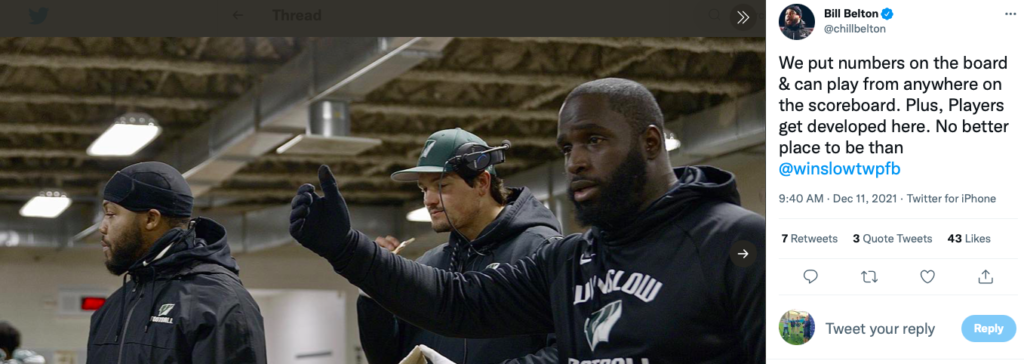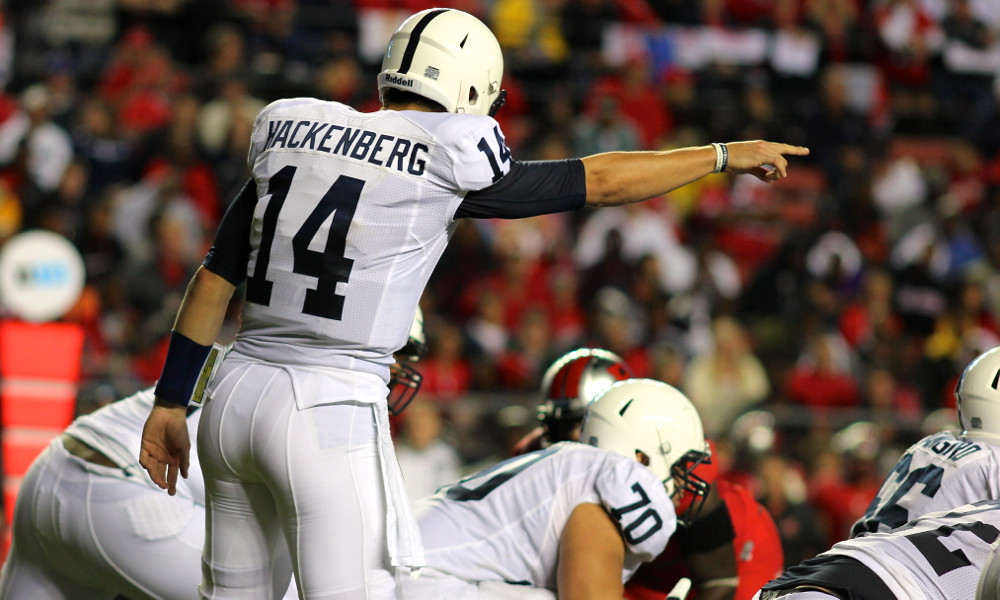It’s hard not to draw comparisons between Drew Allar and Christian Hackenberg.
Hackenberg — once among one of the nation’s most highly touted quarterback prospects — was tasked with saving Penn State football, a broad and nearly impossible task in the face of unprecedented NCAA sanctions designed explicitly to make that objective even harder. It was a Kobayashi Maru: a training exercise designed for failure.
While far from perfect in his own right, Hackenberg took hit after hit, sack after sack and question after question over a three-year career that saw his once rising star turn into question marks. Some of his own making, others a product of circumstance. Hackenberg would eventually be drafted by the New York Jets, but his NFL career was short-lived, a residual outcome of the physical and mental beating his college career became.
Nearly a decade later Drew Allar — a five-star recruit out of Medina, Ohio and effectively the nation’s top quarterback prospect in the 2022 class — faces a similar challenge as he puts pen to paper on Wednesday during National Signing Day. The stakes are not stacked against him quiet as heavily as they were for Hackenberg but the charge is the same: take Penn State to the next level.
It’s a high stakes moment in its own right. If Allar succeeds to give Penn State and James Franklin the truly elite quarterback the program lacked, the sky is the limit. If he fails, Penn State and Franklin enter an uncertain spiral with both parties trying to make the most out of what they have.
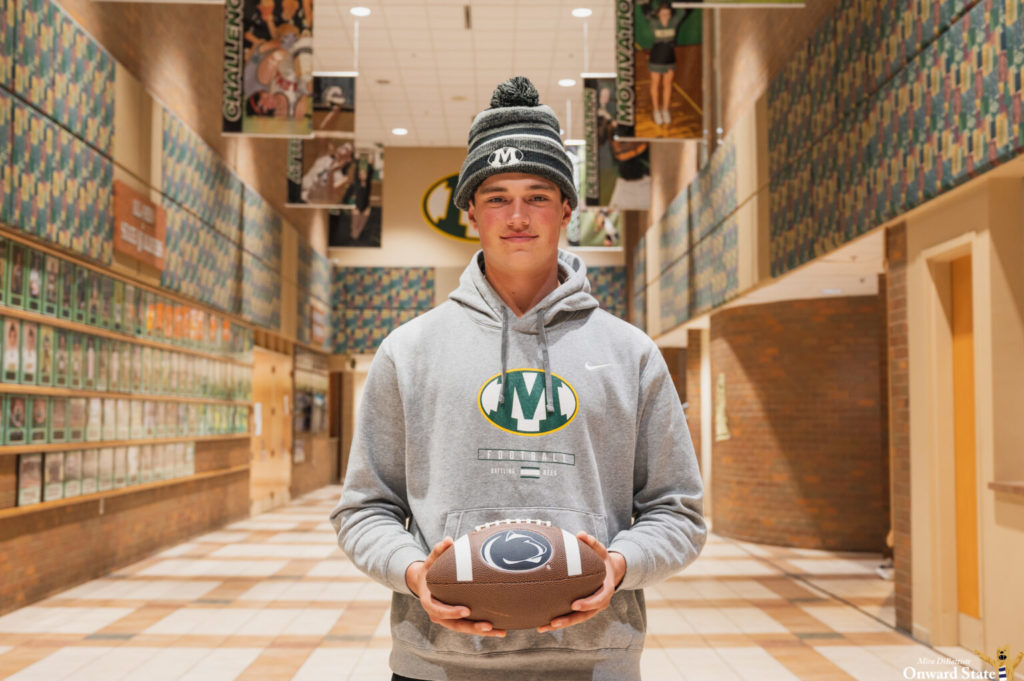
It’s unfair to say Allar is everything. It’s unreasonable to say the program’s next decade could be decided by his arm because football is far more complex than that. Fair or not, it might also hold a lot of truth.
Now coaching alongside former Nittany Lion running back Bill Belton at Winslow Township High School in New Jersey, Hackenberg is maybe the only one who knows what Allar will be going through the next few seasons. The circumstances are different but the pressure is the same. Nobody knows what it’s like to be a quarterback like another quarterback.
And nobody knows what it’s like to see a dream slip through your fingers quite like Christian Hackenberg.
So what advice does one former quarterback have for another? StateCollege.com talked to Hackenberg about his younger counterpart, a Hackenberg of a different era.
SC: You’ve been someone pretty much your entire athletic career. Drew is only just becoming someone because his profile blew up over the last year. What would you tell him about being someone that maybe he doesn’t know yet or is going to learn?
Hackenberg: Um, shoot, that’s that’s a good question. Hold on a sec…
I think the biggest thing, although I was in the limelight since I was like 16 […] my high school coach and my parents never really let me get exposed to it and I wasn’t necessarily in a big area, like I wasn’t in Philly or even like Virginia Beach. I feel like if I was in Virginia Beach, it would have been different. I was kind of isolated in a rural area and Fork Union [in Virginia] doesn’t really allow any of their athletes to read into that. Because when you walk into that building you’re just another name. I mean, the history and the guys that have been there. So fortunately, I just had a great group of people around me so I was kind of numb to it all.
It didn’t hit me until like my sophomore year, up at [Penn State]. I mean, even my whole freshman year, I just didn’t understand the bigness of it. So I guess the advice would be to stay as ignorant as possible. I know that’s really hard to say in today’s world with all the access and all of the money and focus that goes into college sports now, but to stay as ignorant as possible. Just worry about what matters most and that’s your teammates and your coaches and making them better and enjoy that process. Just allow the other stuff to be a part of the job description if that makes sense. Don’t ever let it consume you.
I think it’s hard now with the escalation of college sports and the direction it’s going […] now with all the money and opportunities for kids to make money and stuff like that, it’s gonna get very businesslike. Even though it did feel like more of a job when you went from high school to college and then from college to the NFL there was still that element of pureness, if that makes sense. At the college level, you were always around the guys. You were lifting together; there was continuity and purity that came with that. I feel like now, and I can’t really say from experience because I don’t know what this whole NIL and all this stuff is going, but I feel like it’s definitely gonna throw a monkey wrench in it. Just my perspective looking at it from the outside: make it as pure and fun as possible and still remember it’s about the game and enjoying it. You know what I mean? Just enjoy that process and don’t let it consume you. Fortunately, I think he’s stepping into a better situation than I was with regards to being able to reach his, or at least you know, dabble in what people expect of him. But just like I said, keep all that stuff on the back burner and focus on the meat and potatoes, which is enjoying the process.
SC: When you realized that you are “the guy” for better for worse, what’s the hardest thing about that?
Hackenberg: The quarterback position to me is the most dependent position in sports. You can be as talented as you want to be but there’s a lot of elements that go into you being successful. That was part of my point of like focusing on making your teammates better, focusing on making your coaches better, focus on making yourself better and enjoying that process; because when the expectations and all the noise and all of those other factors aren’t necessarily on your side or tilted towards you being able to play and execute at the highest level for whatever reason [you need to be able to lean on that].
There’s just a ton of elements that go into playing that position. It’s hard to do that in some cases. I’ve been going back to what I’m saying with Drew, he’s in a much better situation than anything that not just myself, but any of the guys that were in my class coming into it with the sanctions, the scholarships, just all of it. So for him, just like I said, take it one day at time and just not get caught up in that bullshit. Just stay as levelheaded as possible and stay and take control of what you can control and help everyone else around you get better.
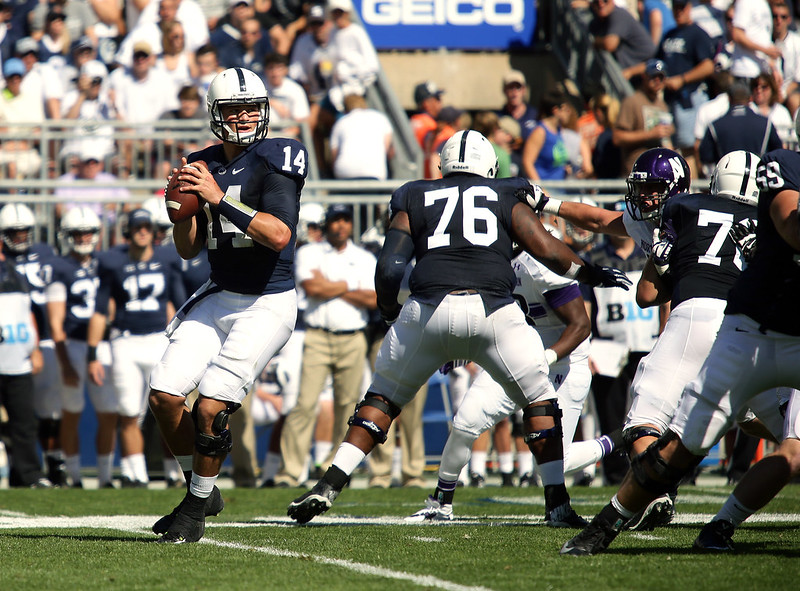
SC: It’s well documented that you took a lot of hits in college for many of the reasons you just said. There’s going to be a point in his career when things don’t go his way. It’s going to be faster, it’s going to be harder. It’s not going to be beating the hell out of guys in Ohio anymore. And in those moments, how do you not lose everything that made you good? Everything that makes him good? How do you still find that when it’s hard?
Hackenberg: Yeah, I mean, that’s the million dollar question right? …You develop scars and calluses and sometimes you can’t overcome them and, ultimately, I think that was my biggest thing. When I got to the NFL there were so many things for me that mentally — I didn’t and I couldn’t realize this then but I can now — that I couldn’t overcome. And now having gone through a year of coaching, helping kids and being able to explain my situation and reflect on it better [has been great] … You can be as talented as you want to be, like to this day I still feel like I could play if I wanted to.
But there’s things that happen. There’s things from a physical tool standpoint, but there’s things that happen and there are scars that happen and mentally, being able to develop the strength and ability, that’s often a part that gets overlooked. That’s the biggest part, being able to overcome all those hurdles and just mentally being able to reset and not let it affect you.
That’s one thing I learned personally and I learned a little bit too late and I think for him, being able to focus on that side of things and compartmentalize that. Some guys have it, some guys don’t. Some guys the situations kind of allow them to grow through it and others don’t. Again, just going back to the business and the luck of the draw at times with playing that position. But really, I’d say work on that side of things. You’re gonna go into the weight room and you’re gonna develop physically and then from an X’s and O’s standpoint in the film room you’re going to develop mentally. But then there’s also that element of being able to develop from a psychological side of things, and dealing with those experiences of failing that he probably has never experienced up until this point in his career.
So when those things do happen, rely on other people and don’t be afraid to ask for help. Figure out a way to create a roadmap and a plan for yourself from a sports psychology side of things to be able to climb out of it and not forget who you are and what got you there and and how to continue to get better in those areas without letting the other things create too much scar tissue that you can’t get through.
SC: Thinking about it now, Penn State’s sports psychology department really didn’t get going until after your time on campus.
Hackenberg: Yeah, I didn’t know of anything up there. And like I said, it was so fast and furious, dude. I was only on campus for two and a half years. Like I said I was so ignorant and fortunately I had a lot of older guys who helped me out. Coach O’Brien and I had a certain type of trust and relationship. I knew what he wanted, he knew what I wanted, and we were kind of on the same level from that standpoint.”
And I had guys like Ty Howle and John Urschel and Allen [Robinson], just a lot of older guys that helped me out so I wasn’t necessarily thinking about “how can I help them out?” They were like “How can we support this kid and then let him just go play because when he’s kind of numb, he’s fine.” You know what I mean? So I really didn’t have to battle those issues like I did my sophomore year where I walked into spring ball and it’s like I’m 19-years-old and I’m considered a vet. I’m one of the oldest, most experienced guys on the offensive side of the football.
That’s why I think it’s hard to necessarily — in my eyes — to compare that experience to anybody else. And I think fortunately for Drew, he’s not going to have to experience that. For him, it’s just about continuing to figure out ways to rely on guys to hone the entire thing. And when you have those things at your disposal [sports psychology] the mental performance side of things, definitely focus on that too because that’s a huge part of it. Being able to play free and being able to not let those experiences impact the way you perform and the way you think about things…
SC: You didn’t have the luxury of a gap year, and it’s hard to really compare the situations. All things being equal it seems more likely than not that he doesn’t play in 2022. If he has a year off from playing in games, what’s the best use of his time over that span?
Hackenberg: I think really it would be mastery within the offense. [There has been a lot of change at offensive coordinator over the years] so I hope for his sake, they find some consistency on that side of the ball with that. And if that’s the case for him, I would just find as much comfort and extra time with either the offensive coordinator or the quarterback coach for sure. (Penn State offensive coordinator Mike Yurcich is also the quarterbacks coach in this case.)
And then if not that, anybody else who has any type of influence within the offense and just really try to be on the same wavelength as the play caller as a freshman. Take the game seriously in terms of being on the sideline, playing the game in your brain, and doing things like that. Those mental reps are huge. Those are something that I never had to do in college and that I had to try to learn how to do in the NFL and had a really hard time figuring out how to really own those mental reps. And ultimately he’s going to have that opportunity. If he doesn’t have it this fall to compete he’s going to have it in the spring and it looks like it’s going to be his job to lose ultimately when [Sean Clifford] leaves. So really, really focus on focus on taking advantage of the time off, not just chilling, but approaching it as best as you can to be able to take advantage of every rep, whether it be physical or mental.
And then the other thing is just really trying to level with the guys on the team. And that’s a huge part of it. You have to be able to insert yourself in a way where you can touch every guy, you can influence every guy, you can do those extra things with throwing sessions and things like that where you can start developing rapport within the locker room without being a threat or without being an ego. There’s a balance in that and I think that’s huge, especially with everything that he’s got coming in: the stars, the press, the expectations. Being able to level as just a really good hard working guy and earn those guys’ trust, especially some of those older guys. I think that would be massive for him too.”
SC: Do you see some of yourself in him, in terms of the you know – you were supposed to save the world and he’s supposed to save the world. You’re in very different circumstances, but where do you draw the comparisons?
Hackenberg: It’s funny. I was up [in the Lasch Building] this summer for a wedding and I was in the building and Jevin Stone and I were catching up and he was telling me that when [Drew] first came in there [Stone] took like three triple takes because he looks exactly like I did. A long, tall, gangly kind of kid and some of the same facial structure. So that was funny. I’ve never had the opportunity to speak to him, but from my understanding there definitely are some comparisons and then definitely from [the media] side of things and the expectations there are going to be some comparisons and there’s gonna be some ability to draw to draw comparisons in that world.
So, you know, like I said, I just hope that no one puts anything on him from that standpoint. Like just let him be him. And he needs to be him and not try to be anybody else. And like I said, just work every day on being a leader within the locker room. If you can win the locker room, no matter what’s going on outside – the storm, the good, the bad, the ugly. If you can win that locker room over, that’s something you can always lean on. And at least from my experience, that’s something I think I had for the most part. I had the support of all my guys and that’s what mattered to me most throughout my career. I mean to this day, I still talk to every single one of those guys and if I hadn’t talked to him in a while I could call him tomorrow and we wouldn’t have skipped a beat. So I guess from a comparison I hope he has that in him. Because if he does, then I think he’ll be alright.
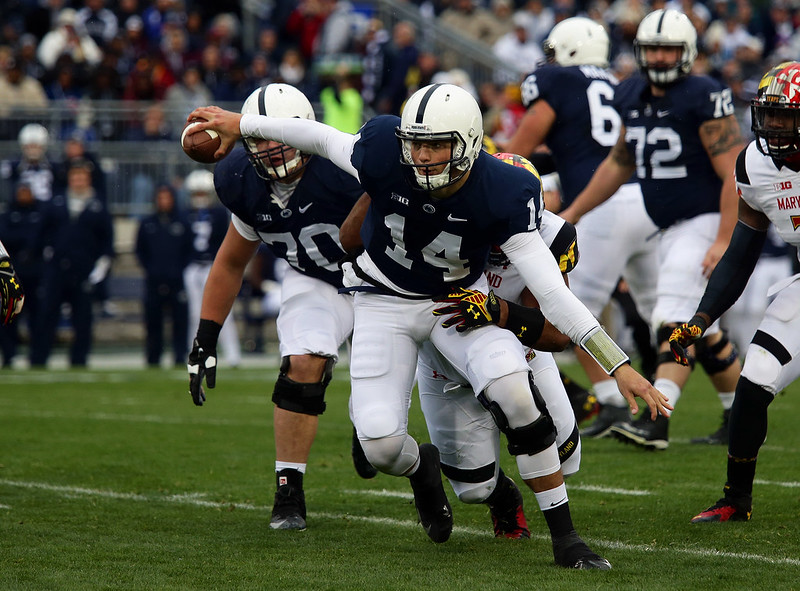
SC: Before I let you go, how are you? How long does it take to make peace with where you’re at [with your own career]? I imagine that when it’s all said and done, it’s a little weird and a little hard. You’re not that old and now you’ve been facing the question “what happened to this thing I’ve spent my entire life getting ready to do [play in the NFL] and now it’s not happening?” How do you do you make peace with that? Does coaching help? Where are you at?
Hackenberg: You know, the hard part is at the end of the day you can say what you want about my college career. I feel like I still pretty much broke almost every passing record up there and then Trace came in and I was happy as hell that he shattered them. That’s awesome. He was a great, great teammate and a kid who I really enjoyed spending time with. So I feel like from a college perspective, you know, I get a bad rap. Even my last two years. My sophomore year was probably my toughest year but even my junior year, like I was pretty happy with my junior year. I think there was (pauses) without getting into it, I made it a point going into my junior year that I was going to have a ton of fun. And I did and you know whether the numbers or whatever equated to that to everybody else’s perspective, like that was good for me.
So that was something that really helped with my college career. Then going into my NFL career, to your point, that’s a really hard pill to swallow at times. But I think like I said, you know, I had a lot of scar tissue going into that and if I got drafted into a different situation, who knows, like, there’s a lot of things that play into it. And ultimately those were things that were out of my control and the things that were in my control I did go and try to address towards the end of my career, and I think I did at that point. You get labeled and it’s hard to climb over those. It’s hard to overcome those in that business because of the competition and the amount of turnover and, you know, you just gotta have some people that are looking out for you and I didn’t necessarily have that and that is what it is.
So for me I’ve kind of put that at peace. I’m still part of a 1% [players who make the NFL] and that’s awesome and that’s something that no one can take away from me. I think the biggest thing has been being able to still be involved in the game and coach and then also take that approach that ultimately got me to where I wanted to get in the NFL and take that same approach [to other things]. I finished my degree; that was awesome. I’m working on some pretty cool things and that’s all that’s that’s great for me too. And now just trying to help as many kids as I can at the high school level and give guidance and experience and that’s great too. So there’s that ability to be able to reflect, analyze and then learn from it. Really that old adage that you don’t fail, you learn and things like that.
I think that’s been the biggest thing with the career path for me. And yeah, I mean ultimately I’m at peace with it, like I can’t say it doesn’t suck but when it comes to being at peace with it I’m 1,000% at peace with it because I can’t complain at the life I have. And you know, I’ve got brothers that are doing their thing. One is playing professional soccer, the other one is playing professional baseball. The youngest one just got to Virginia Tech and he’s playing baseball down there. So I get to go watch them now. So I think the giving aspect of it and having been through some unique experiences at a very young age has really helped me have the ability to pass that along. I think that really helps in terms of, if I didn’t ever pass it along and I had to just fight mentally with myself every day with it, that’d be really hard, but I have a lot of avenues to be able to pass it along and talk about it. Helping people not make the same mistakes or help people who are making a mistake that I never made, make that mistake and say this is what helped me ultimately get to where I wanted to get to. That’s freaking awesome for me. So you know, that’s where that’s where it makes the whole thing so much easier.
